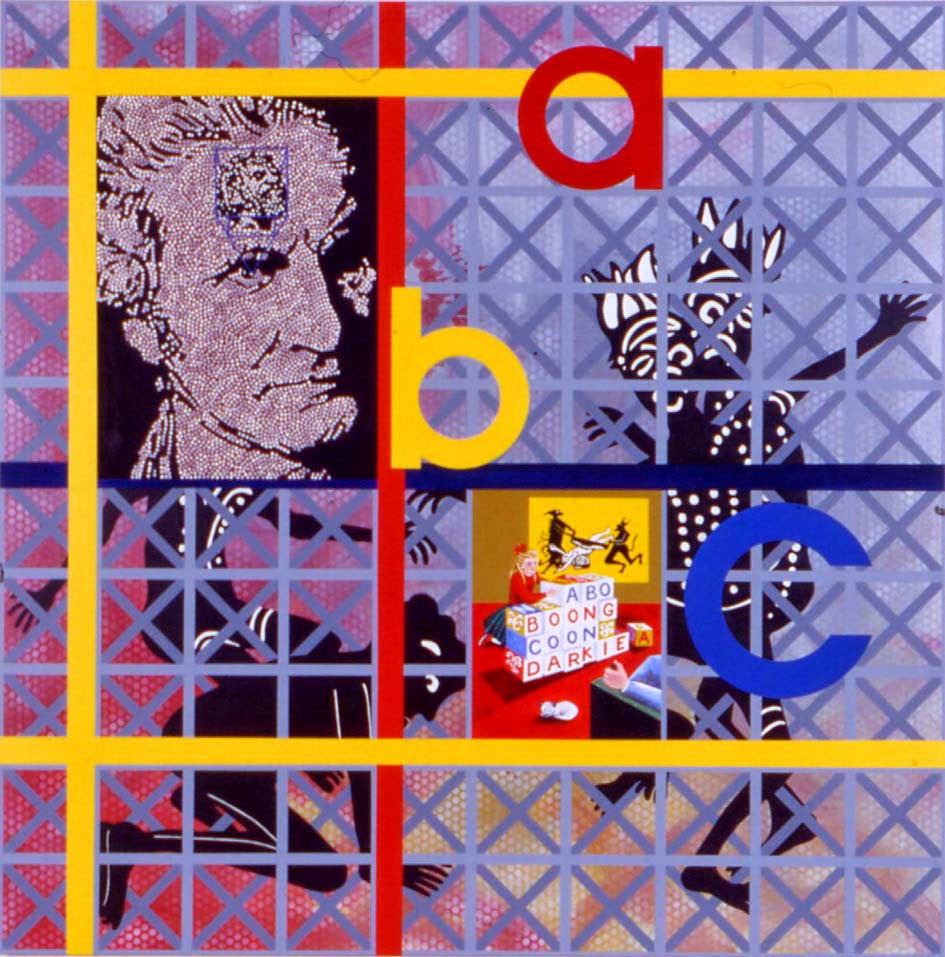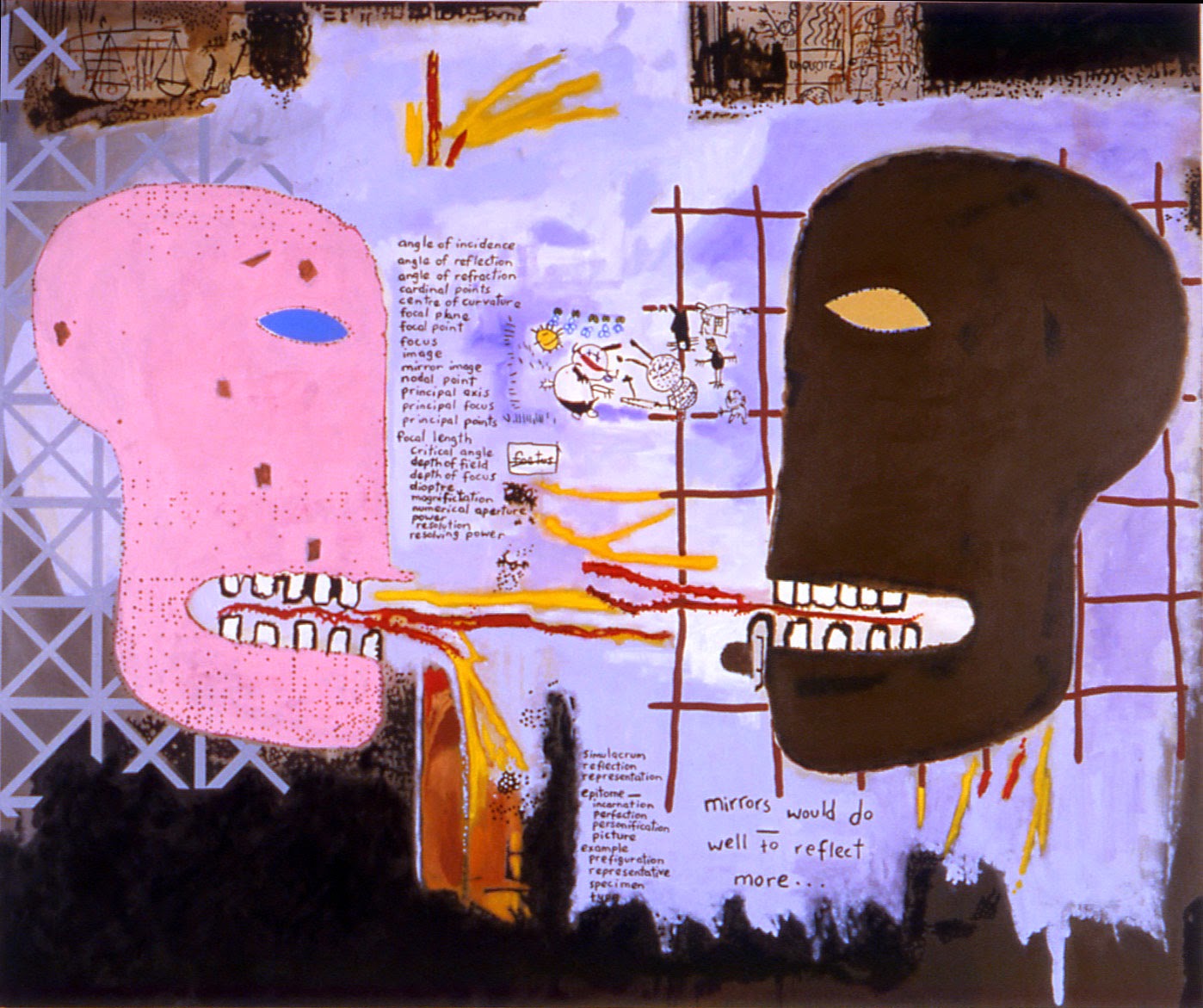Monday 16 June 2014
Zara Stanhope

Gordon Bennett Home decor (Algebra) Daddy's little girl 1998
Australian artist Gordon Bennett broke new ground with his distinctive images which commented on local and global issues and questions of contemporary existence. Art offered a means of communication for Bennett that was not possible through other channels. He sought out art, undertaking a Bachelor of Arts in Fine Art in his hometown of Brisbane at Queensland College of Art. He developed a language in painting and printmaking to interrogate the colonial history of Australia, which was significant in Bennett’s own life. A prolific outpouring of images during the late 1980s and 1990s tapped into postcolonialism and poststructural rethinking of established histories and discourses.
Both commercial and institutional representation were important for the public awareness of Bennett’s practice. Thanks to his gallerists, Bennett’s work had regular presentations in Brisbane and Melbourne, as well as Sydney and Adelaide. His paintings, works on paper and videos were the subject of solo exhibitions in Australia, the United Kingdom and the Netherlands. Bennett’s works appeared in major exhibitions including dOCUMENTA 13, Germany (2012); the 9th and 12th Biennale of Sydney (1992 and 2000); The Third Asia Pacific Triennal, Brisbane (1999), and a long list of other significant exhibitions.
Bennett’s art was significant for its stand on big issues, as well as its ability to get highlight elements of everyday existence. His reflections on the myths perpetuated in Australian history, such as terra nullius, and attitudes towards Australian Aboriginal people, raised audience awareness of identity politics and the need to re-examine colonial and modern narratives. Bennett’s images of lost explorers seeking the apocryphal inland sea, references to the perspectival tools and mapping of European Enlightenment and the negation of Indigenous presence remain imprinted on viewers. Bennett’s practice was important for artists as well as audiences, setting a significant example of an artist unafraid to engage with the contemporary issues of race, sovereignty and citizenship for emerging Australian Indigenous artists.

Gordon Bennett Notes to Basquiat: Double vision 2000
Bennett remained attuned to the ideological effects of language, images, media and other forces on contemporary life. In recent years, works such as the Camouflageimages or the seminal Notes to Basquiat paintings engaged with newer currents in our existence – fear and terror as they were amplified after 9/11 and the Second Gulf War. In these, like his abstract grid paintings of the last decade, Bennett invited viewers to identify undercurrents of meaning and create broader associations.
Bennett’s art was contemporary in more than just its subject matter. In larger series of paintings he worked in a cut-and-paste mode, drawing on other artists’ imagery, and also recycling motifs across time and works. This strategy of appropriation and self re-deployment could be interpreted as a reversal of appropriation – an act on behalf of a people whose history includes the loss of land and the ‘Stolen Generation’. References to the paintings of Piet Mondrian and de Stijl artists in Bennett’s Home Decor works, in which images from Australian modernist artist Margaret Preston’s designs also figured, operated in this way. Aspects of Jean-Michel Basquiat’s imagery regularly reappeared, in homage and sympathy, in this case.
In recent years Bennett also painted under the name John Citizen, a nom de plumethat suggests the everyman. Citizen was the artist of the Interior paintings, images abstracted from photographs published in lifestyle magazines. Strangely coloured (often painted with leftover studio paints), these urban interiors evoke the banality of material culture resulting from regarding one’s consumer status as a contemporary social aspiration.
Art and ideas are poorer with the loss of Gordon Bennett on 3 June 2014. His practice stimulated thinking across many areas of the humanities and broke new ground in art engaging with contemporary issues in the West. Bennett’s practice will continue to provide a productive challenge to audiences and evidence the social value an artist can bring by mining untold narratives and visualising under-represented histories.
Image credits:
Gordon Bennett
Home decor (Algebra)
Daddy’s little girl 1998
synthetic polymer paint on canvas
182.5 x 182.5 cm
Private Collection, Melbourne
Gordon Bennett
Notes to Basquiat: Double vision 2000
Synthetic polymer paint on canvas
152.3 x 182.7 cm
National Gallery of Victoria, Melbourne
Purchased through the NGV Foundation with the assistance of Henry Gillespie, Governor, 2000.
Images courtesy of Sutton Gallery, Melbourne